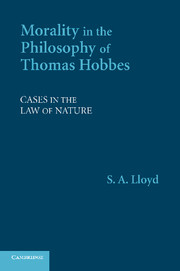Book contents
- Frontmatter
- Contents
- Preface
- Introduction
- PART ONE MORAL PHILOSOPHY, METHOD AND MATTER
- PART TWO FROM PSYCHOLOGY TO MORAL PHILOSOPHY
- 3 The Law of Nature: Definition and Function
- 4 A Critical Examination of Derivations of the Laws of Nature
- 5 The Reciprocity Interpretation of Hobbes's Moral Philosophy
- PART THREE FROM MORAL PHILOSOPHY TO CIVIL PHILOSOPHY
- Bibliography
- Index
3 - The Law of Nature: Definition and Function
Published online by Cambridge University Press: 30 September 2009
- Frontmatter
- Contents
- Preface
- Introduction
- PART ONE MORAL PHILOSOPHY, METHOD AND MATTER
- PART TWO FROM PSYCHOLOGY TO MORAL PHILOSOPHY
- 3 The Law of Nature: Definition and Function
- 4 A Critical Examination of Derivations of the Laws of Nature
- 5 The Reciprocity Interpretation of Hobbes's Moral Philosophy
- PART THREE FROM MORAL PHILOSOPHY TO CIVIL PHILOSOPHY
- Bibliography
- Index
Summary
[I]f they sin against right, they do, as much as in them lies, abolish human society and the civil life of the present world.
(EW II, 152)An account of Hobbes's Laws of Nature adequate to explain how agents can be motivated to adhere to the normatively inescapable requirements Hobbes speaks of as the Laws of Nature will ideally provide plausible answers to five distinct questions:
First: What is the definition of a Law of Nature?
Second: What function ultimately unifies the particular rules
Hobbes enumerates under the term “the Laws of Nature”?
Third: How are the Laws of Nature normative for agents? That is,
what makes their demands binding on us?
Fourth: What can be expected to motivate our compliance with
the normative demands of the Laws of Nature?
Fifth: What is the metaphysical status of the Laws of Nature? Are they divine commands, precepts of individual prudence, rule-egoistic principles, freestanding natural duties, or yet something else? And are they literally laws?
Most discussions of Hobbes's Laws of Nature have tended to conflate these questions, particularly the first with the second, the second with both the third and fourth, and the third with both the fourth and the fifth. I suspect that what explains much of this eliding of useful distinctions is that it has seemed obvious to many commentators that the Laws of Nature are, essentially or by definition, instructions for promoting the agent's own preservation or profit, and it is their serving that function that grounds their normativity and motivational efficacy.
Information
- Type
- Chapter
- Information
- Morality in the Philosophy of Thomas HobbesCases in the Law of Nature, pp. 97 - 150Publisher: Cambridge University PressPrint publication year: 2009
